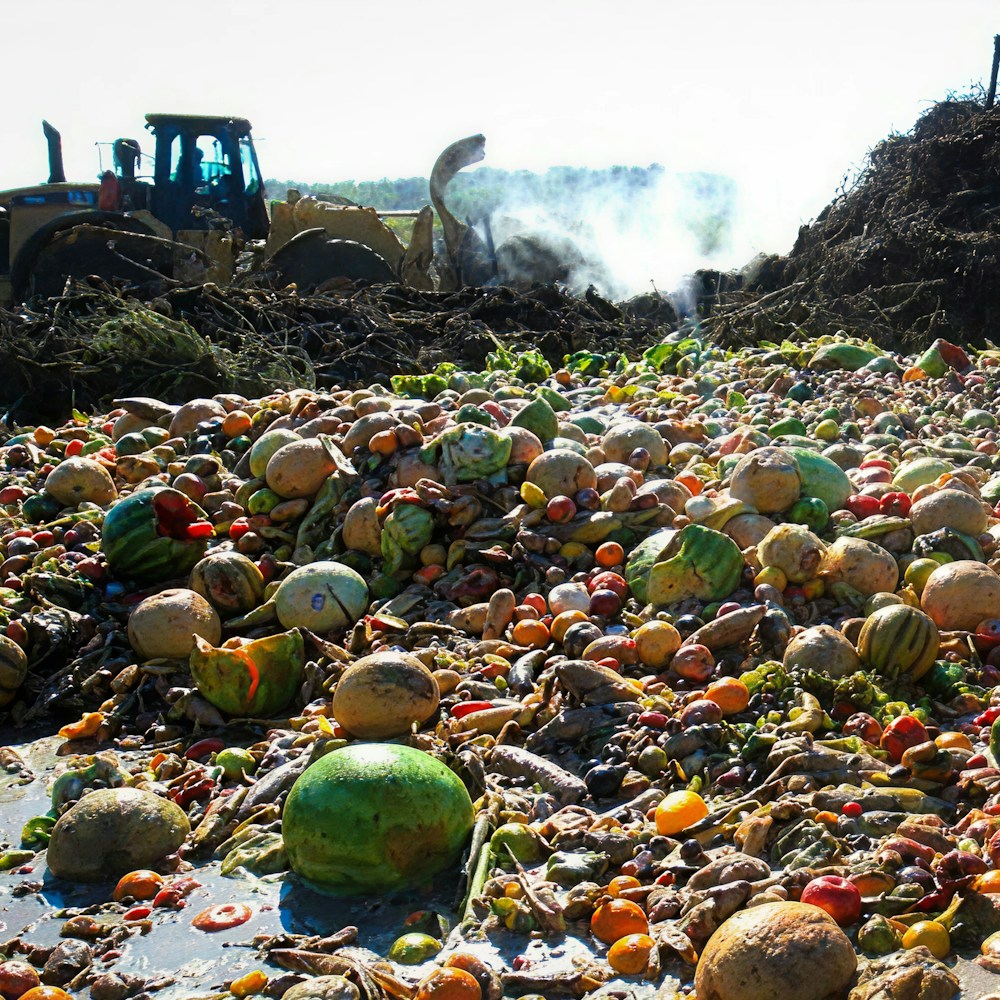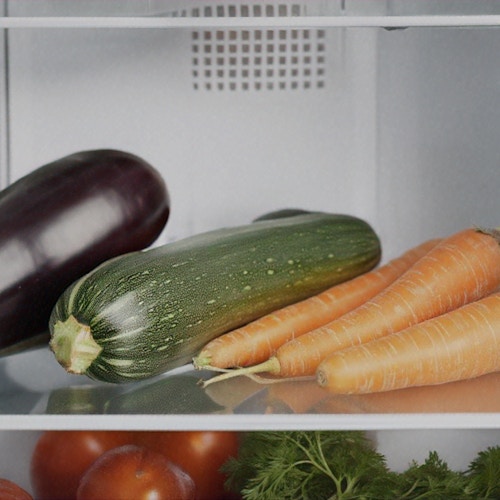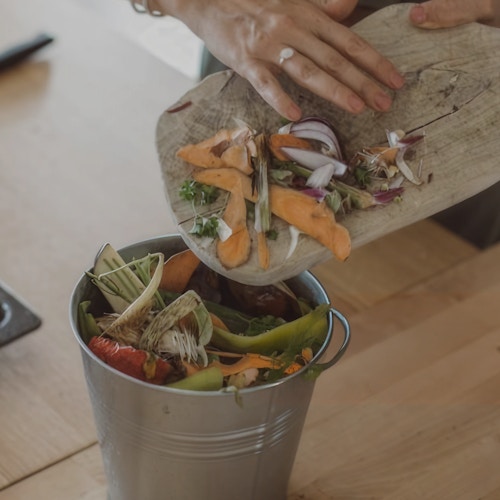
The environmental impact of food waste and how we can make a difference
→
Discover how food waste affects the environment and what we can do to reduce its impact with simple changes and tools like Shelfy by Vitesy.
- The hidden environmental cost of food waste
- Food waste and its contribution to greenhouse gas emissions
- The unsustainable use of resources in food production
- Food waste in the supply chain
- Impact on biodiversity and ecosystems
- Reducing food waste at home: simple steps to make a big impact
- The economic impact of food waste
- The role of policy and government in reducing food waste
- Conclusion: how small changes can lead to a sustainable future
The hidden environmental cost of food waste
Food waste is one of the most urgent environmental issues of our time. As a global problem, it’s not just about the food being thrown away but the far-reaching environmental consequences. Every year, nearly a third of all food produced in the world is wasted, with severe consequences for our planet.
In this article, we’ll explore the environmental impact of food waste and how we can make a difference with simple yet effective changes. From understanding the role food waste plays in greenhouse gas emissions to adopting practical solutions like Shelfy by Vitesy, we’ll see how small changes can make a big difference.
Food waste and its contribution to greenhouse gas emissions
Food waste doesn’t just disappear when it’s thrown away, it causes harmful side effects. When food decomposes in landfills, it releases methane, a powerful greenhouse gas that is 25 times more effective at trapping heat in the atmosphere than carbon dioxide.
Methane emissions from food waste are responsible for a significant portion of global warming. In fact, food waste accounts for about 8% of total global emissions. This is equivalent to the emissions from all the cars in the world combined.
The good news is that by reducing food waste, we can directly reduce methane emissions, impacting global efforts to fight climate change. Whether through mindful shopping, proper food storage, or technologies like Shelfy, every action helps make a difference.

The unsustainable use of resources in food production
Food production requires vast resources, water, land, energy, and labor, all of which are wasted when food is thrown away. For example, producing one kilogram of meat requires about 15,000 liters of water. When that meat is wasted, all those resources are wasted as well.
The energy and land used to produce food that ultimately doesn’t reach our tables contribute to deforestation, water shortages, and depletion of natural resources. Reducing food waste helps ease these pressures by making the most of the resources already invested in food production.
Shelfy’s ability to extend the shelf life of fruits and vegetables significantly reduces spoilage, helping to manage resources more effectively and reduce waste.
Food waste in the supply chain
The food system is complex, and waste happens at every step of the way, from farm to table. In developing countries, much of the food loss occurs at the farm level, where crops are discarded due to imperfections or poor transportation infrastructure. In developed nations, food waste is more common in retail and consumer settings, where over-purchasing, improper storage, and neglect lead to the spoilage of perfectly edible food.
Reducing food waste in the supply chain is critical to addressing the environmental crisis. By adopting smarter practices like responsible sourcing and more efficient logistics, we can prevent waste before it even reaches the consumer. Consumers can also do their part by ensuring food is stored properly and used in a timely manner. Solutions like Shelfy can help extend food shelf life, reducing the likelihood of spoilage.
Impact on biodiversity and ecosystems
Food production is one of the leading causes of habitat destruction and biodiversity loss. To meet growing food demand, forests are cleared, wetlands are drained, and ecosystems are destroyed. This has a devastating effect on wildlife populations and the environment.
By reducing food waste, we can reduce the pressure to expand agricultural land, which in turn helps protect biodiversity. Supporting sustainable farming practices and reducing food waste are integral components of a more sustainable and eco-friendly food system.
Reducing food waste at home: simple steps to make a big impact
The good news is that reducing food waste doesn’t require drastic lifestyle changes. Small, consistent actions can have a significant impact. Here are some practical steps for reducing food waste at home:
- Plan your meals: create a shopping list based on your needs and stick to it.
- Store food properly: use airtight containers, freeze leftovers, and maintain the right fridge temperature.
- Repurpose leftovers creatively: transform leftover food into new dishes.
- Portion control: cook only the necessary amount of food to avoid leftovers going bad.
- Invest in technology: use smart gadgets like Shelfy to keep food fresh longer, thus reducing waste.
Every step you take to reduce food waste is a step toward protecting the environment and conserving valuable resources.

The economic impact of food waste
Food waste is also an economic issue. On average, a household throws away hundreds of dollars’ worth of food every year. This includes fruits, vegetables, meat, dairy, and packaged goods.
The economic burden extends beyond households and affects restaurants, retailers, and businesses globally.
By reducing food waste, not only can households save money, but businesses can improve efficiency and cut costs. The savings from reducing food waste can be reinvested into other areas, making it a win-win situation for both the environment and the economy.
The role of policy and government in reducing food waste
Governments play an important role in food waste reduction. Countries around the world are implementing policies aimed at minimizing food waste, including food recovery programs, tax incentives for businesses that donate food, and public awareness campaigns.
For instance, France has passed a law that prohibits supermarkets from throwing away unsold food, forcing them to donate it instead. In the U.S., several states are adopting composting and food donation laws to prevent waste.
However, the responsibility doesn’t lie solely with governments. Businesses and consumers must work together to make a meaningful change.
By encouraging the reduction of food waste through awareness and actions, we can help governments and businesses meet their environmental goals.
Conclusion: how small changes can lead to a sustainable future
Food waste is an urgent environmental issue that affects everything from our climate to our economy. However, it’s not a problem without solutions. Small changes at home, smarter policies, and innovative products like Shelfy can make a big difference in reducing food waste and its impact on the planet.
By understanding the environmental consequences and adopting new habits, we can all contribute to a more sustainable future.
Start today, every small action counts.




